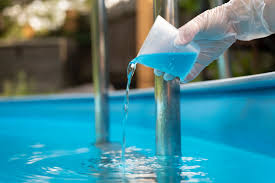Keeping a pool clean and free from algae is a constant battle for many pool owners. A pool algaecide is a powerful tool that prevents and removes algae, ensuring your pool stays crystal clear and safe for swimming. However, not all algaecides are created equal. Choosing the right one for your pool involves understanding the different types, factors to consider, and proper application techniques. This article will help you identify the best pool algaecide for your specific needs and explain why purchasing from a pool algaecide wholesaler can be a smart, cost-effective choice.

Why Is Pool Algaecide Necessary?
Algae can quickly take over a pool, turning the water green, cloudy, or even black. It not only ruins the appearance of the pool but also creates slippery surfaces that pose safety risks. Common causes of algae growth include:
High Temperatures: Warm weather accelerates algae growth.
Poor Filtration: Inadequate circulation creates stagnant water where algae thrive.
Low Chlorine Levels: Insufficient sanitizer levels allow algae to grow unchecked.
Although chlorine helps manage algae, it’s not always enough to prevent outbreaks. A pool algaecide works by targeting algae cells directly, preventing their spread and eliminating them at the root. Regular use ensures that your pool remains clean and inviting throughout the swimming season.
Types of Pool Algaecides
Choosing the best pool algaecide begins with understanding the three main types available:
1. Quaternary Ammonium Compounds (Quats)
Characteristics: Affordable, effective, and commonly used for prevention.
Best for: Residential pools with mild algae problems.
Drawbacks: May cause foaming if overused, affecting water clarity.
2. Polyquaternary Algaecides (Polyquats)
Characteristics: Non-foaming and more effective than standard Quats.
Best for: Pools with recurring algae issues.
Drawbacks: Higher cost compared to Quats.
3. Metal-Based Algaecides
Characteristics: Contain metals like copper or silver that disrupt algae at a cellular level.
Best for: Stubborn algae such as black or yellow algae.
Drawbacks: Potential staining on pool surfaces if misused.
How to Choose the Best Pool Algaecide
To select the best pool algaecide for your pool, consider the following factors:
1. Pool Size and Type
The size of your pool affects the amount of algaecide needed. Large pools or commercial pools may require more concentrated or industrial-grade products. Sourcing from a pool algaecide wholesaler can be advantageous in such cases, ensuring an adequate supply at a lower cost.
2. Type of Algae
Not all algaecides are effective against every type of algae.
Green Algae: Common and relatively easy to treat with Quats or Polyquats.
Yellow (Mustard) Algae: More resistant and requires stronger formulations.
Black Algae: The toughest to eliminate, often requiring metal-based algaecides.
3. Non-Foaming Properties
For pools with water features like fountains or jets, non-foaming algaecides are essential to maintain water clarity and appearance.
4. Safety for Pool Surfaces
Metal-based algaecides, while effective, may cause staining on vinyl, fiberglass, or plaster if overused. Check product labels to ensure compatibility with your pool’s material.
5. Environmental Concerns
If you’re eco-conscious, look for biodegradable or eco-friendly algaecides that minimize environmental impact while maintaining effectiveness.
Benefits of Buying from a Pool Algaecide Wholesaler
If you manage multiple pools or have high usage, purchasing from a pool algaecide wholesaler can be a practical and cost-effective choice.
1. Cost Savings
Wholesalers offer discounted rates for bulk purchases, significantly reducing your overall expense.
2. Reliable Supply
Buying in bulk ensures you always have enough algaecide on hand, especially during peak pool seasons.
3. High-Quality Products
Reputable wholesalers work with trusted manufacturers, ensuring that you receive effective and safe algaecides.
4. Expert Guidance
Many wholesalers can provide advice on selecting the best pool algaecide for your specific needs, whether for residential or commercial use.
Common Mistakes to Avoid
To get the most out of your algaecide, steer clear of these common errors:
1. Overusing Algaecide:
Excessive use can lead to foaming or chemical imbalances. Always follow the product instructions.
2. Ignoring Filtration:
Poor circulation reduces the effectiveness of algaecide. Ensure your pool’s pump and filter are working properly.
3. Skipping Regular Maintenance:
Algaecides are most effective when used as part of a comprehensive pool care routine that includes cleaning and chlorine treatments.
4. Using Expired Products:
Expired algaecides lose potency. Check expiration dates before applying.
Conclusion: Maintaining a Pristine Pool
A pool algaecide is a vital tool for keeping your pool clean and algae-free. By understanding the different types, evaluating your pool’s unique needs, and following proper application techniques, you can ensure long-lasting results.
For pool owners or operators managing large facilities, partnering with a pool algaecide wholesaler can save money and provide access to high-quality products. The best pool algaecide is one that fits your pool’s specific requirements, offering effective algae control while maintaining water safety and clarity.
